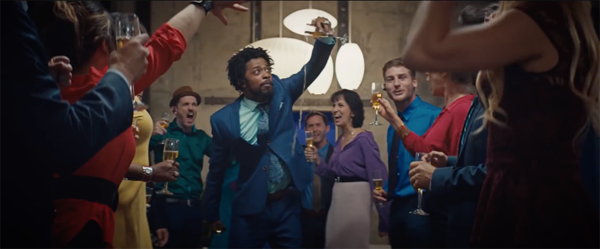
The less you know about Sorry to Bother You, the better. Though that may discourage you from reading beyond this point, it must be said, because this debut feature from writer-director and underground rapper Boots Riley is a trip.
Echoing the surrealistic office comedy of Joe Versus the Volcano, Sorry to Bother You follows Cassius “Cash” Green, a going-nowhere peon working for a soul-sucking telemarketing company in a bizarre, alternate present-day Oakland. In debt and lacking prospects, Cash is buoyed by his artist girlfriend, Detroit, magnetically portrayed by Thor: Ragnarok’s Tessa Thompson. Detroit is a beacon of dignity and self-respect whose guiding light is obscured by the allure of wealth and power. When Cash isn’t lost in existential contemplation, he’s daydreaming about the better half, hoping he might one day be promoted to “Power Caller.” This elite rung of telemarketers has its own upper floor, accessed only via a luxurious, key-coded elevator. Cash’s luck finally turns around the day a co-worker helps Cash find his “white voice.” More than just code-switching, Cash’s white voice (portrayed onscreen in the best, funniest way possible) opens many doors—including elevator doors—for him.
Get Out’s Lakeith Stanfield gives Cassius the relatable realism of a man reluctantly leaving his friends and family behind as he both climbs, and is forcefully pushed up, the corporate ladder. As we follow Cash’s journey to the upper echelons of society, Sorry to Bother You slowly reveals its weird world. Aided by a whimsical yet creepy score, the blackly comic allegory comes into focus, at which point the film becomes a full-on, f’d-up fairy tale. From the mega-corporation Worry Free and the activists fighting against it, to the minotaur-maze mood of a mansion’s basement, to the violent, viral videos and number-one TV show, Sorry to Bother You is the reflection of our world in a funhouse mirror, a warped parable that is at turns harrowing, horrifying and hilarious, often all at once.
Bolstered by excellent performances throughout, and lovingly laced with references and meticulous detail, Sorry to Bother You is a unique vision that can best, but inadequately, be described as a cross between the work of Terry Gilliam and Jordan Peele. Boots Riley’s delightfully gonzo satire is an astounding debut.













